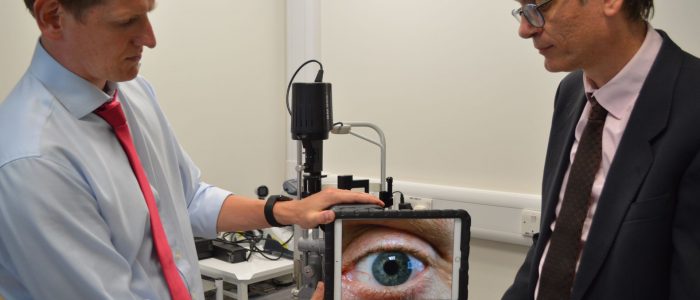World’s First 5G Tele-Examination of an Eye
Consultant ophthalmologist and director of digital innovation at Moorfields Eye Hospital, Peter Thomas, and Iain Livingstone, consultant ophthalmologist and the acute tele ophthalmology system lead from NHS Forth Valley, delivered the world’s first tele-examination of an eye in 4K resolution using 5G broadband, which was streamed live between London and a conference in Edinburgh.
Together with NHS clinical entrepreneur Chrishan Gunasekera, Peter Thomas used a 5G connected smartphone attached to a portable slit lamp outside the Richard Desmond Children’s Eye Centre to provide a live image of his eye for examination to Iain Livingstone at the conference. This demonstrated that an eye image of high enough quality to be used in clinic can be streamed in real time, opening up great potential for telemedicine in the future.
This remote imaging was achieved using the Attend Anywhere platform, which utilised 4K streaming to provide a high quality video feed where the smallest details of disease can be visualised by an ophthalmologist who may be many miles away. This tele-examination was also able to utilise London’s and Edinburgh’s brand new 5G network and existing portable slit lamps which are low cost and widely accessible, allowing a full consultation without the need for a clinic room.
The NHS Forth Valley/Strathclyde emergency teleophthalmology network has now become business as usual in NHS Forth Valley, and is presently being piloted across multiple Scottish Boards and Primary Care.
This approach has many potential benefits to patients, including the added convenience for patients who might no longer need to travel into hospital and can be examined by a distant specialist ophthalmologist at their local optometrist or accident and emergency department. The platform could also provide more patients with access to specialists in rare diseases who might be based far away from the patient. In addition, providing detailed examinations remotely could increase the access to specialist advice for patients in under-resourced countries, providing there is a good internet connection and some low cost equipment.
Moorfields is planning on launching teleconsultation services to our patients on the Attend Anywhere platform as part of an NHS Improvement pilot in the next few months.
Peter Thomas, director of digital innovation and consultant ophthalmologist at Moorfields Eye Hospital, said: “This demonstration marked a significant turning point in tele-ophthalmology as we were able to deliver such detailed images in real time, using readily available equipment. At Moorfields we have some very highly specialised doctors in rare diseases who could make their expertise available at a greater distance with this technology, which could have a significant positive impact on many patients.”
Chrishan Gunasekera, NHS clinical entrepreneur, said: “It’s been amazing to utilise the full resolution of one of the latest smartphone cameras to perform a remote eye exam. This will really be transformative to patient care.”
NHS Forth Valley consultant ophthalmologist, Iain Livingstone, , said: “I was excited to see the first ultra-high resolution tele-ophthalmology call via the 5G network. Keeping pace with these technological advancements means we can send and receive remarkably high definition video referrals which are particularly useful for relaying fine detail during a remote eye examination.
“We are delighted to see the system, collaboratively pioneered by NHS Forth Valley and the University of Strathclyde, get traction in more Health Boards across Scotland and variations evolve south of the Border.”
Dr Mario Giardini from University of Strathclyde’s Department of Biomedical Engineering, which is a partner in Scotland’s teleophthalmology team, said: “The emergence of 5G technology offers vast opportunities for medicine and healthcare. We demonstrated in this consultation how effective and valuable it can be as a tool for diagnosis and decision making.
“The quality of telecommunications is now allowing the transmission of very detailed images, and we expect that telemedicine will soon reach the same clarity as in-person consultations, connecting remote areas to doctors, and promoting equality in access to healthcare.
“These results clearly underline the importance of collaboration between technology research and development, doctors, and healthcare infrastructure; we are delivering this with our partners.”





